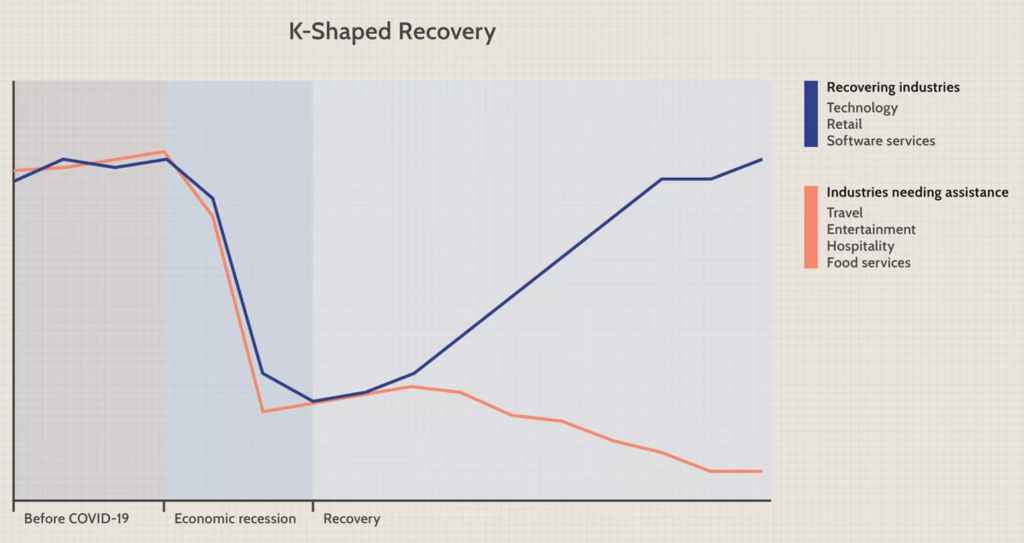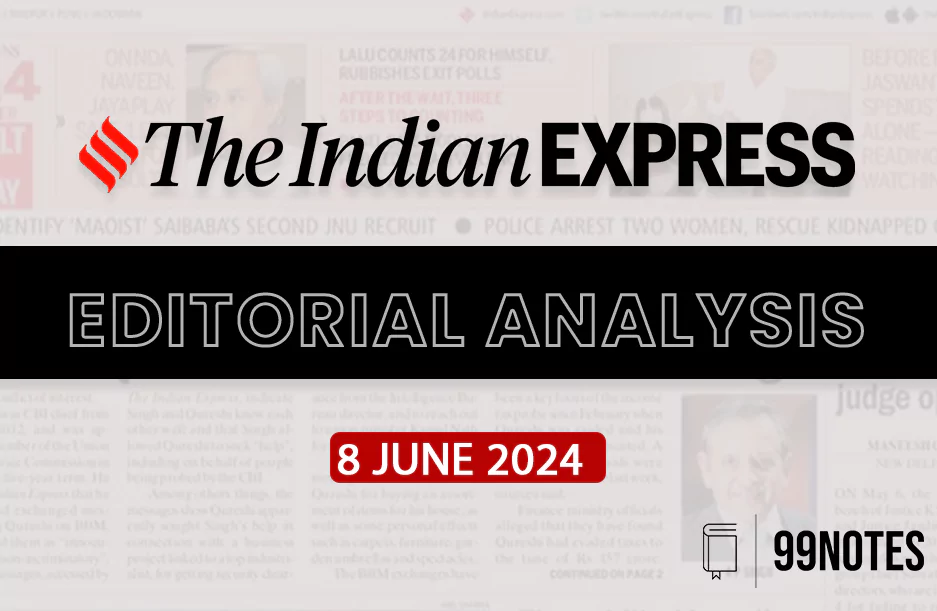8 June 2024 : Indian Express Editorial Analysis
1. PLUG THE LEAKS
(Source: Indian Express; Section: The Editorial Page; Page: 12)
| Topic: GS2 – Social Justice – Education |
| Context: |
|
Impact on Young Voters:
Youth Disillusionment
- The pervasive issue of exam paper leaks and the resulting cancellation of exams have significantly disillusioned young voters aged 18-25. These large-scale standardized exams, intended to be reliable mechanisms for recruitment, have failed to meet their promise.
- The emotional and financial toll on aspirants, many from remote and marginalized backgrounds, is substantial. Aspirants often undertake debts to pay for application fees, coaching, and training, only to see their efforts nullified by systemic failures.
- This disillusionment has contributed to a shift in the political landscape, as young voters seek accountability and solutions from political parties.
Examination System Critique:
Standardized Testing Challenges
- Globally, standardized tests like the SAT and ACT are critiqued for their limited curriculum and emphasis on rote learning.
- In India, similar standardized recruitment exams are employed by state public service commissions for various government positions.
- However, the recurring issue of paper leaks undermines the efficacy of this model. Aspirants, who invest significant time and resources in preparing for these exams, face repeated cancellations and delays.
- This not only disrupts their plans but also fuels a growing distrust in the examination and recruitment process.
Political Repercussions:
Electoral Impact
- The issue of exam paper leaks has had notable political repercussions. In Uttar Pradesh, the BJP’s poll prospects were significantly affected by the outrage among young aspirants, particularly after three major competitive exams were hit by leaks in 2024.
- The INDIA bloc effectively tapped into this discontent, promising fast-track courts and monetary compensation to affected aspirants. Similarly, in Rajasthan, frequent paper leaks under the Congress tenure influenced the state’s legislative elections in December 2023.
- These instances underscore how educational and employment issues have become pivotal in shaping electoral outcomes.
Socio-Economic Implications:
Generational Mobility at Stake
- For many young aspirants, cracking these recruitment exams represents a chance at generational mobility through securing a government job.
- The extensive planning and sacrifices involved in exam preparation, including migration to cities for coaching and taking up unrelated jobs for sustenance, highlight the stakes for these individuals.
- The repeated failures of the examination system not only thwart their immediate job prospects but also jeopardize their long-term socio-economic advancement.
Government Response and Youth Sentiment:
Inadequate Measures
- The government’s response to curb exam paper leaks has been perceived as inadequate. Despite passing the Public Examinations (Prevention of Unfair Means) Act in 2024, the persistent leaks point to systemic issues that require more robust and transparent mechanisms.
- The involvement of commercial players, including coaching centers and consulting agencies, complicates the situation further.
- The resultant anxiety and disappointment among the youth have not been effectively addressed, leading to a growing sense of frustration.
Conclusion:
- The 2024 elections have highlighted a shift in political priorities among young voters, who have prioritized education, employment, and social justice over traditional issues like communalism and temple politics.
- The exam paper leak scandals have served as a catalyst for this shift, reflecting the urgent need for reforms in the recruitment and examination system.
- As young voters continue to seek accountability and tangible solutions, political parties must adapt to these evolving priorities to maintain their support base.
| What are the Key Provisions of Public Examinations (Prevention of Unfair Means) Act in 2024? |
|
Defines Public Examination:
Punishments:
Punishment for the Service Providers:
Defines Unfair Means:
Investigation and Enforcement:
Model Draft for States:
High Level National Technical Committee:
|
| Practice Question: Discuss the impact of frequent exam paper leaks on young voters in India’s Hindi heartland and analyze how these issues influenced the 2024 Lok Sabha election outcomes. What measures can be taken to address the systemic failures in the recruitment and examination process? (250 words/15 m) |
2. Is it the economy, stupid?
(Source: Indian Express; Section: The Ideas Page; Page: 13)
| Topic: GS3 – Indian Economy |
| Context: |
|
GDP Measurement Challenges:
- Within the economic community, it is known that India’s GDP measurement faces significant challenges, including faulty deflators, outdated sectoral weights, and poor measurement of the informal sector.
- These issues have not received much public scrutiny, partly due to the silence from international organizations and ratings agencies. For instance, recent discrepancies between nominal and real GDP growth figures suggest implausible inflation trends, raising questions about the accuracy of official statistics.
- Despite these measurement flaws, there remains a broader electoral puzzle to be solved.
Unequal Growth Distribution:

- Analysts argue that the electorate’s dissatisfaction stems from the unequal distribution of economic growth benefits. The K-shaped recovery suggests that government policies have disproportionately favored the wealthy, exacerbating inequality.
- While it is true that standards of living have improved across the board, the growth has been unbalanced.
- The services sector, particularly export-oriented services, has thrived, benefiting high-skilled workers, while agriculture and manufacturing have lagged, affecting those with fewer skills. This imbalance has contributed to the electorate’s frustration.
Favored Sectors:
- India’s economic model has historically favored export-oriented services over agriculture and manufacturing. Post-pandemic, the surge in Global Capability Centres (GCC) employment has spurred a construction boom, benefiting related sectors.
- Conversely, agriculture has suffered from government policies that turn the terms of trade against it, such as export restrictions during price surges.
- This sectoral imbalance has created discontent among farmers and unskilled workers, further explaining the electoral outcome.
Modi Government Policies:
- Several policies under Modi have exacerbated economic imbalances, particularly affecting the informal sector.
- The demonetization initiative, flawed GST implementation, and stringent pandemic lockdowns have devastated informal enterprises.
- Despite efforts to boost manufacturing through subsidies like the Production-Linked Incentives (PLI) scheme, these have been offset by protectionist policies and a lack of focus on labor-intensive sectors.
- Moreover, the perceived favoritism towards big business houses has discouraged broader investment, affecting job opportunities and economic growth for the majority.
Conclusion:
- To reconcile the economic data with the electoral results, it is evident that growth has not been as dynamic or as balanced as official numbers suggest.
- The overall economic pie has not grown sufficiently, and its benefits have been unequally distributed.
- The unskilled workforce in agriculture, informal, and manufacturing sectors experienced the economy negatively, aligning with ground-level reports.
- Alternatively, rejecting explanations of faulty measurement and an inherently slanted development model would leave us with an unprecedented puzzle in global democratic politics: that significant economic growth led to electoral defeat.
| PYQ: Explain the difference between computing methodology of India’s gross domestic product (GDP) before the year 2015 and after the year 2015. (150 words/10m) (UPSC CSE (M) GS-3 2021) |
| Practice Question: Examine the paradox of India’s recent electoral outcome where significant economic growth did not translate into electoral success for the incumbent government. Discuss the role of GDP measurement issues, economic inequality, and the impact of specific government policies in shaping this result. (250 words/15 m) |




